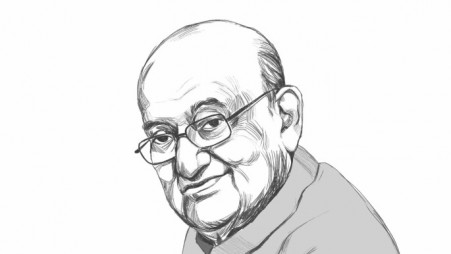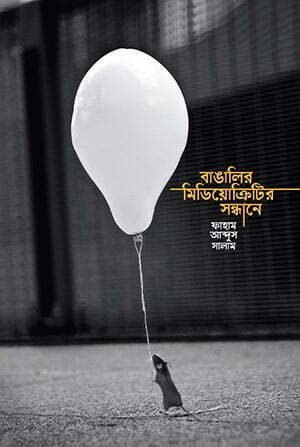Bilal9
ELITE MEMBER

- Joined
- Feb 4, 2014
- Messages
- 26,569
- Reaction score
- 9
- Country
- Location
TBS Sketch

TBS Sketch
The country has made remarkable progress in the last 15 years in a number of different areas and ongoing crises do not undo the work, Professor Rehman Sobhan said at a discussion today.
Unveiling the latest publication of "Citizens' Platform: Development narratives and parallel realities", the senior economist, whose Centre for Policy Dialogue has turned 30 this year, highlighted the upcoming national elections, saying central to their whole exercise was to ensure that the voice of citizens are heard by those who will be participating in elections.
"Problem is if elections are not held properly, if voices cannot be made heard to politicians and leaders, then holding discussions turns fruitless. If they want political support, then they should listen to the voice of the citizens and have to prove that they are taking steps and they are entitled to return to office," he said.
On the bright side, Sobhan highlighted the country's significant and sustained growth, which he said was not a small issue.
"Over a period of 15 years, in fact even before that, to progressively grow at a rate of 5, 6, 7, sometimes even 8%, it is a very big achievement.
"Our forex reserves were once almost about $50 billion. Unfortunately, it now came down to close to $20bn, this does not distract from the fact that it reached $50bn," he said.
Aside from growth, the prominent economist also brought up the strides made in the infrastructural side.
"The Padma Bridge has been built. It's a huge task and we should offer congratulations because that is an exclusively government-inspired project. It was actually more inspired by the prime minister and we should congratulate her and her government for this," he said.
He, however, said while infrastructure bore fruits, not all were equally important.
"I am not going to identify here which are less important and which are more. What I want to say is that putting importance on infrastructure in any developing economy is important. Because without this, there will be no growth, poverty reduction or creation of employment opportunities."
On the other hand, he said these investments also came with an opportunity cost which have to be considered.
"What is that opportunity cost? This book (the citizen's platform report) has the answer – many people are left behind. The person left behind bears the opportunity cost of the flyover. Because many things could have been done with that expenditure, but it may not have been done sufficiently."
Prof Sobhan again reiterated the importance of properly implementing the mandate of voters by their representatives.
"The 2006 publication of the Citizens Platform was utilised in the election platform of the then Awami League when contesting the 2008 elections, which is good," he said, seeing not much solutions to people's issues in the last 16 years.
"Not much has changed since the first report. This means the proposals, which the then ruling party committed to in its election manifesto, still remains valid today, because these are the problems brought up by the common people. The government should understand that these are the concerns voiced by people around the country," he said.
Even though revenue-GDP ratio is only 8%, resources have improved much and the national budget is above Tk.6 lakh crore.
"If we are spending this sum of money, then there is no good reason why the significant part of it could not be used to solve the problems of the people of LNOB (leave no one behind) category," Prof Sobhan said, referring to the problems, as identified in the report, being faced by a section of people within women and youths, senior citizens, indigenous people, dalits, climate victims, transgender, tea workers, fishermen, migrants, farmers.
"These are all manageable numbers and these problems are solvable problems."
Then why problems could not be addressed?
There was a problem in allocative priority, he identified, asking if construction of expressway was prioritized over the issues of dalits.
"Resource wise, this is a solvable problem. But it was not solved, because we gave priority elsewhere."
He also pointed to implementation problem caused by corruption, lack of governance and absence of enough pressure on the implementing agencies to implement their tasks efficiently and without corruption.
"Democratic failure is here, too," he said,
Elaborating, he said, one measure of a representative government is to be "in office with the mandated freely given vote of your citizens." Many of the issues that appeared in the citizens' report should have been resolved by a representative government, whose first responsibility is to meet the primary obligation of citizens, particularly those who are the most deprived.
He asked how far a just and equitable society has been built. "Now socialism is not in use. We talk about it using proxy words like inclusive, just, equitable society.
How far have we progressed in that direction?" he said, observing that grassroots people's own accounts are louder than statistical data.
"Not about the constitution alone, if Bangabandhu's dreams are to be implemented here, then what was his vision of Bangladesh? What did he fight for?
"He fought for an independent Bangladesh. He also fought for a just and equitable Bangladesh," he said, pointing out that there are much more 'kotipotis' (millionaires) holding bank accounts in Bangladesh now compared to "22 families" said to have ruled during the Pakistan period.
"People, who are holding much larger resources, not just here, but all over the world, represent a departure from the vision of Bangabandhu," said Prof Sobhan, a member of the country's first planning commission, feeling the urgency of campaigns by the civil society to see if public resources are spent for social safetynet, what portion of it is going as subsidies to a narrow segment of the elite through loan write-offs.
"These are all public resources which are effectively being used to subsidise a certain class of people which is contributing to the growing inequality in the society," he pointed out.
Giving his critical views in the process of electing people's representatives from parliament to union parishads, he pointed out that public resources are not effectively used even in a functioning democracy, if seats are filled with those who spent money in violence and force to get into representative positions.
Civil society groups should monitor if public expenditures are made justly in their areas and spent for those who need the most.
"Now lakhs of people claim that they are engaged with civil society. Have they been doing enough?" he said, posing a question if the civil society groups are monitoring these issues, raising voice and playing a proactive role "without depending on donor funding."
"When we discuss the rights issues we should not only take stock what the government has done or not, we should also talk about what the civil society has done or not done," he said, feeling that the civil society has the scope to put pressure on the government both national and local levels, and use the power of courts to make sure available resources are used effectively.
The civil society can also hold the judiciary accountable "if they are discharging their obligations as per the constitution to give independent rather than partisan judgements," he noted.
[ Prof. Rehman Sobhan is one of the foremost senior economic minds of South Asia. He has an illustrious family pedigree.
Sobhan's father, Khondker Fazle Sobhan, was a graduate of Presidency College, Kolkata and one of the first Muslims to qualify to attend Royal Military Academy Sandhurst.[1] Later he rose to become a ranked officer in the Indian Police Service.
Sobhan's mother, Hashmat Ara Begum, was a niece of Sir Khawaja Nazimuddin, the Governor General of Pakistan during 1948–51 and Prime Minister of Pakistan during 1951–53.[1]
His son Zafar Sobhan (trained in law at Pepperdine and is a member of the New York State Bar) is the Editor of the Dhaka Tribune. He was a Young Global Leader in 2005.
Sobhan married Salma Sobhan in 1962. Mrs. Sobhan was the first lady barrister in East and West Pakistan, as well as the founder of the Centre for Law and Mediation. After her death in 2003, he then married Rounaq Jahan, a political scientist and a Distinguished Fellow at CPD. Mrs. Jahan currently teaches at Columbia in NYC.
Nobel Prize winning economist Amartya Sen was a Cambridge classmate and a lifelong friend.
His younger sibling Farooq Sobhan is Bangladesh's former foreign secretary and headed the Bangladesh Enterprise Institute.
He is related on his mother's side to is Princess Sarvath al-Hassan - an overseas Bangladeshi, a Jordanian royal and the wife of Prince Hassan bin Talal.
Sobhan went to St. Paul's School, Darjeeling at the age of seven and completed his Senior Cambridge examination in 1950.[1] He then attended Aitchison College in Lahore for two years.[1]
He went on to Cambridge University to earn his bachelor's degree. After completing his undergraduate degree at Cambridge, Sobhan moved to Dhaka in January 1957.[1]
In late 1966, Sobhan went to the LSE for his graduate studies but returned, without completing his degree, to Dhaka in March 1969 after the fall of the Ayub regime.
He joined as a faculty member of the department of economics at the University of Dhaka in October and served until 1971. In a seminar in 1961, he made a remark on the economic disparities between West and East Pakistan saying "Pakistan consisted of two economies".[1] It made the headlines on the Pakistan Observer and the then President of Pakistan Ayub Khan expressed the opposite point of view.[1]
After the liberation of Bangladesh in 1971, Sobhan was appointed a member of the Planning Commission. He quit when he, along with others, fell from the grace of Sheikh Mujib in 1975.
Later he worked as the director-general of Bangladesh Institute of Development Studies. Between 1976 and 1979, he was a visiting fellow at Queen Elizabeth House, University of Oxford.
After retirement from BIDS, he set up Centre for Policy Dialogue in 1993, a high-profile private sector think-tank, where he works as its Executive Chairman.
It is our honor in Bangladesh that we still have this living legend among us.
Last edited:



